HVAC Companies Troon
Find top Heating and Cooling Services in Troon
Receive up to 3 HVAC Contractor quotes for your project today! Compare profiles, reviews, accreditations, portfolio, etc... and choose the best service.
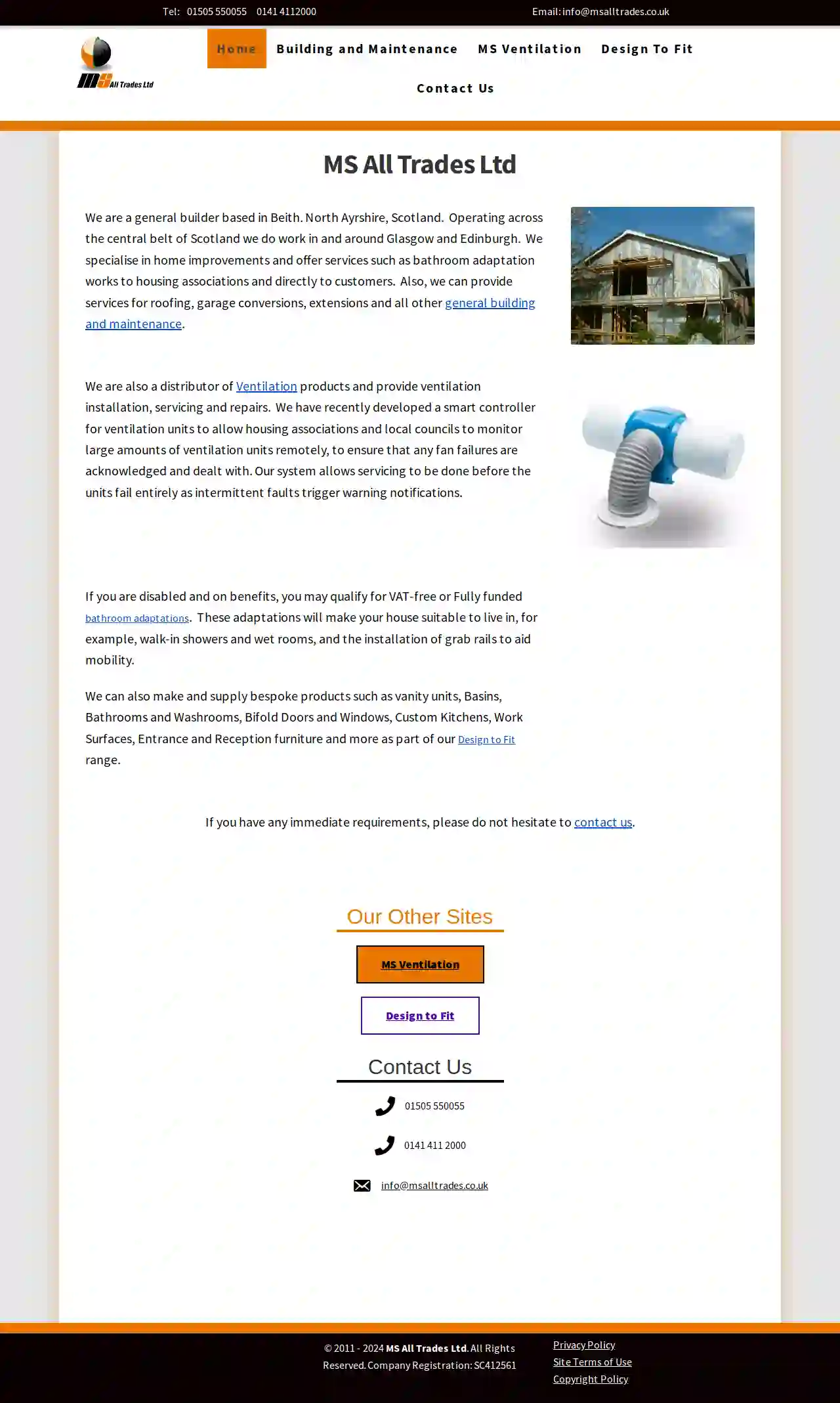
MS All Trades Ltd
45 Eglinton Street, Beith, GBMS All Trades Ltd is a general builder based in Beith, North Ayrshire, Scotland. Operating across the central belt of Scotland, we do work in and around Glasgow and Edinburgh. We specialise in home improvements and offer services such as bathroom adaptation works to housing associations and directly to customers. We can also provide services for roofing, garage conversions, extensions and all other general building and maintenance. Additionally, we are a distributor of Ventilation products and provide ventilation installation, servicing and repairs. We have recently developed a smart controller for ventilation units to allow housing associations and local councils to monitor large amounts of ventilation units remotely. Our system allows servicing to be done before the units fail entirely as intermittent faults trigger warning notifications. We also offer bespoke products such as vanity units, Basins, Bathrooms and Washrooms, Bifold Doors and Windows, Custom Kitchens, Work Surfaces, Entrance and Reception furniture and more as part of our Design to Fit range. If you are disabled and on benefits, you may qualify for VAT-free or Fully funded bathroom adaptations. These adaptations will make your house suitable to live in, for example, walk-in showers and wet rooms, and the installation of grab rails to aid mobility.
- Services
- Why Us?
- Gallery
Get Quote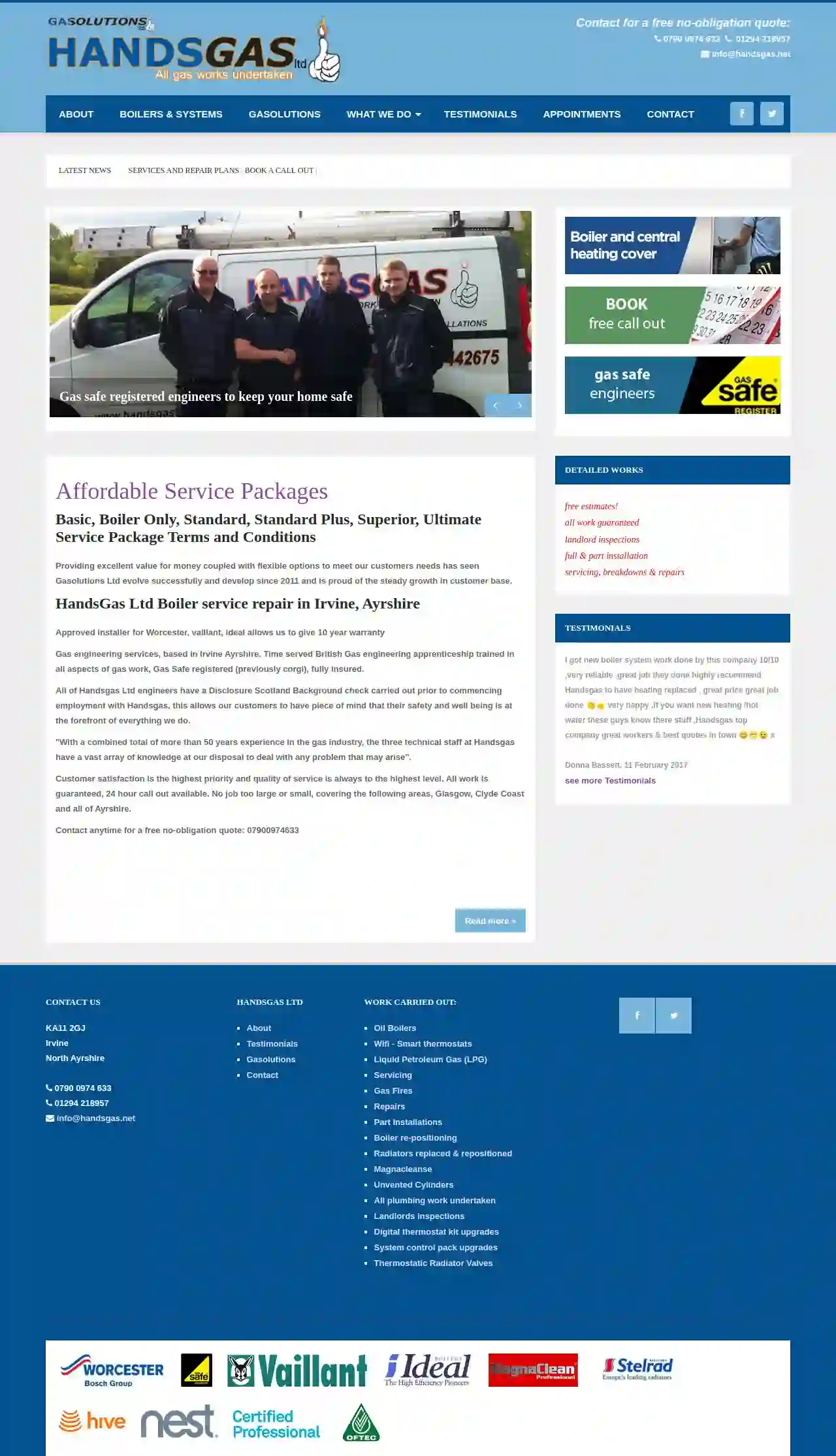
Handsgas Ltd
4.722 reviewsIrvine, North Ayrshire, KA11 2GJ, GBHandsgas is a gas engineering services company based in Irvine, Ayrshire. With over 50 years of combined experience in the gas industry, the company provides a range of services including boiler installations, servicing, and repairs. They are Gas Safe registered and fully insured, and their engineers have Disclosure Scotland Background checks. The company prides itself on providing excellent value for money and flexible options to meet customers' needs. They are approved installers for Worcester, Vaillant, and Ideal, and offer a 10-year warranty on their work. Handsgas is committed to customer satisfaction and quality of service, and has a team of experienced and knowledgeable engineers who can deal with any problem that may arise.
- Services
- Why Us?
- Accreditations
- Our Team
- Testimonials
- Gallery
Get Quote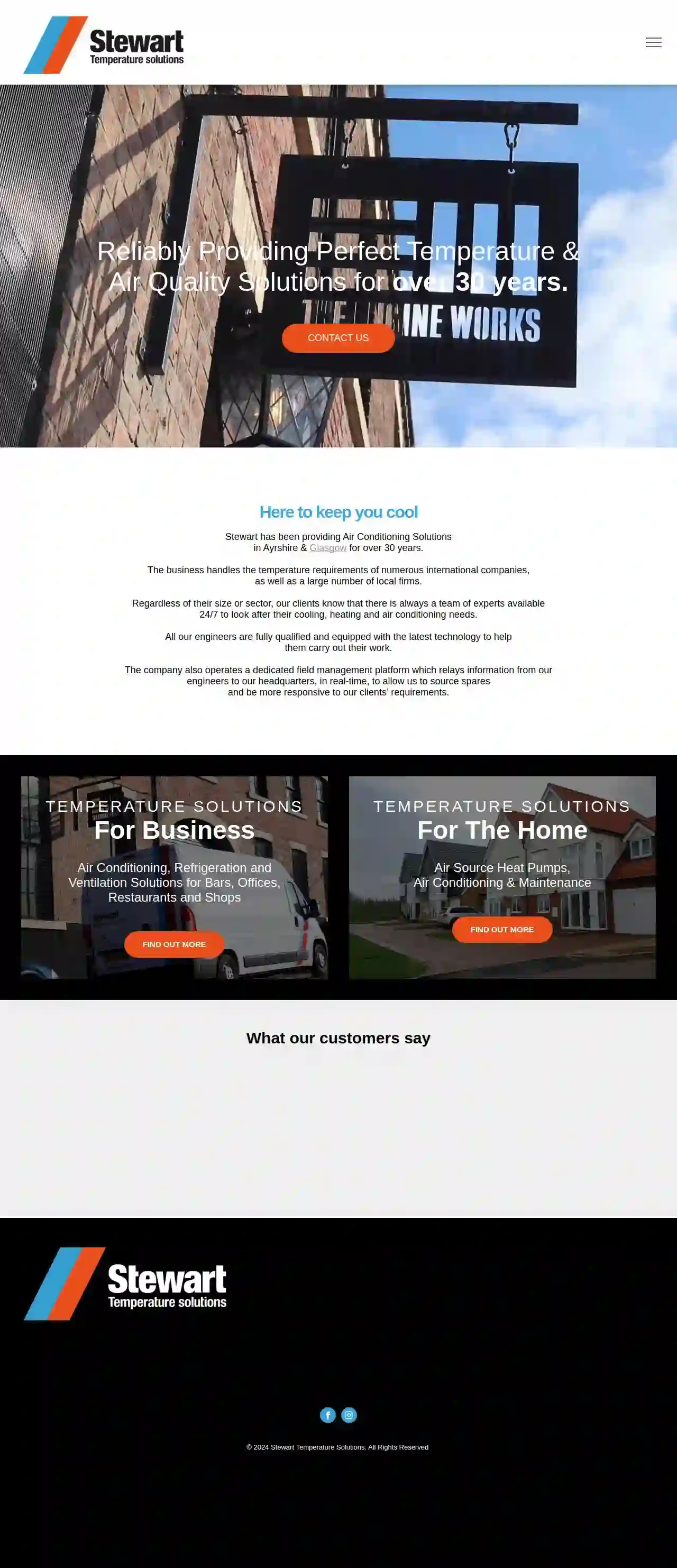
Stewart: Temperature Solutions
4.956 reviewsCambuslea Road, Unit 2 Cambuslea Industrial Estate, Ayr, KA8 9HT, GBReliably Providing Perfect Temperature & Air Quality Solutions for over 30 years. CONTACT US Here to keep you cool Stewart has been providing Air Conditioning Solutions in Ayrshire & Glasgow for over 30 years.The business handles the temperature requirements of numerous international companies, as well as a large number of local firms.Regardless of their size or sector, our clients know that there is always a team of experts available 24/7 to look after their cooling, heating and air conditioning needs.All our engineers are fully qualified and equipped with the latest technology to help them carry out their work.The company also operates a dedicated field management platform which relays information from our engineers to our headquarters, in real-time, to allow us to source spares and be more responsive to our clients’ requirements.
- Services
- Why Us?
- Testimonials
- Gallery
Get Quote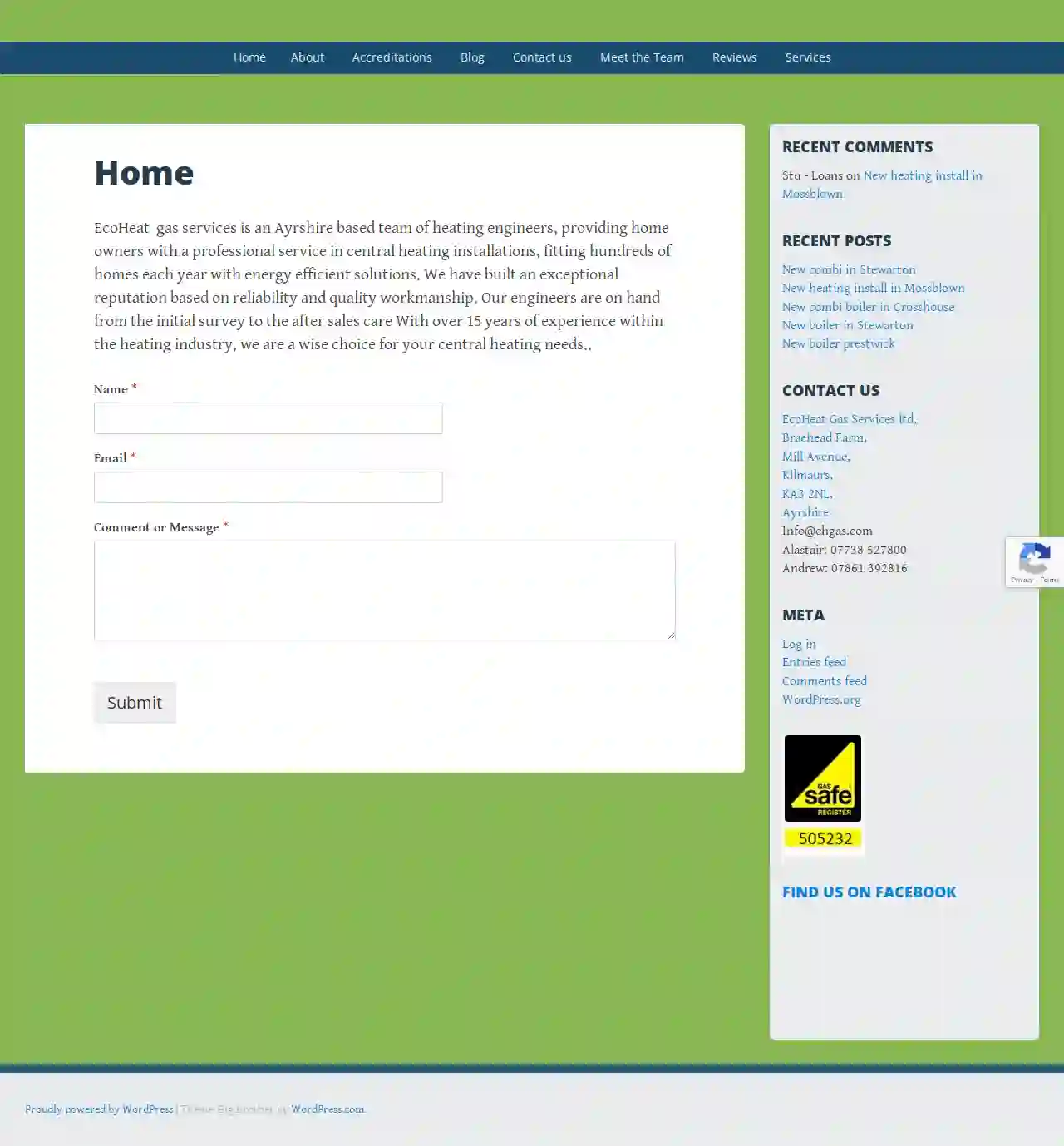
A Hume Gas & Heating Services
51 reviewsMill Avenue, Braehead Farm, Kilmaurs, KA3 2NL, GBEcoheat gas services Ltd, based in Ayrshire, is a team of heating engineers dedicated to providing homeowners with professional central heating solutions. With a focus on energy efficiency, they install hundreds of homes each year, building a reputation for reliability and quality workmanship. Their experienced engineers are available from initial surveys to after-sales care, ensuring a complete and satisfying customer experience. EcoHeat has over 15 years of experience in the heating industry, making them a trusted choice for all your central heating needs.
- Services
- Why Us?
- Our Team
- Gallery
Get Quote
Robert Cameron Plumbing, Heating & Electrical
32 reviews30 Kilnford Crescent, Dundonald, KA2 9DN, GBRobert Cameron Plumbing & Heating is a SNIPEF registered licensed Plumber. The company has been members of SNIPEF since its birth. We can design and install systems and also supply and install solar thermal hot water. We employ our own expert joiners and builders who can construct, extend or repair most types of buildings. Our expert joiners and fitters can make you dream kitchen come alive. Robert Cameron was a master plumber and heating engineer who developed his trade in the 1950's. He went on to found his own company in the early 1980's, which grew under his leadership to become one of Ayrshire's premier plumbing and heating companies, with a reputation for excellence. Robert Cameron Plumbing Heating & Electrical was established in 1997 when his son, Graham Cameron joined the Company. Graham and his team now continue to serve Ayrshire and the surrounding areas today. Over the years we have carried out contracts for many large organisations: The Scottish Executive, Scottish Gas, SSEC, Railtrack, the MOD, Defence Housing Association, Local Authorities, Port Authorities, Engineering companies, House Building contractors, and the Church of Scotland to name a few. The experience gained in a broad range of services has been invaluable in driving the company forward and our business is based on 3 core values: 1. Professional Integrity, 2. Value for Money, and 3. Protecting our Environment. Reducing carbon footprints and fuel bills in homes and businesses is at the core of our company ethos. Corporate social responsibility is an area of interest, particularly the impact that our work has on the wider environment. We continue to develop this by expanding our skills in renewable technologies and have become advisors to our clients in helping to make their buildings greener. With rigorous sourcing and selection of the most fuel-efficient products and technologies, we as a company are confident that we are playing our part towards our planet's and our families healthier future.
- Services
- Why Us?
- Accreditations
- Gallery
Get Quote
Gas Boiler Technicians Ltd
4.948 reviewsForge Industrial Estate, Kilmarnock, KA1 2QP, GBWe are a reliable business located next to Morrisons, Forge Industrial Estate in Kilmarnock. Our mission is to become one of the leading gas businesses in the area and provide the best support to our customers that we possibly can! Have you used an unprofessional tradesman before and lost money without having your heating or plumbing fixed? Have you had to pay several hundreds for many different parts due to the tradesman's lack of knowledge? Get in touch and we will reassure you there is still great tradesmen out there! We specialise in Boiler breakdown and repairs - having an experienced engineer diagnose your Boiler fault could save you hundreds. We are experienced in Boiler Installation - we take pride in our installs and we take care of your home! Our engineers have spent their years working and training with the likes of SSE & British Gas. We comply with all COVID-19 rules when working in your property. We aim to have your boiler fixed same-day or the next-day at the very latest, we have many parts suppliers with stock readily available. We DO NOT take payment until your Heating or Plumbing is working correctly. The team you can trust!
- Services
- Why Us?
- Gallery
Get Quote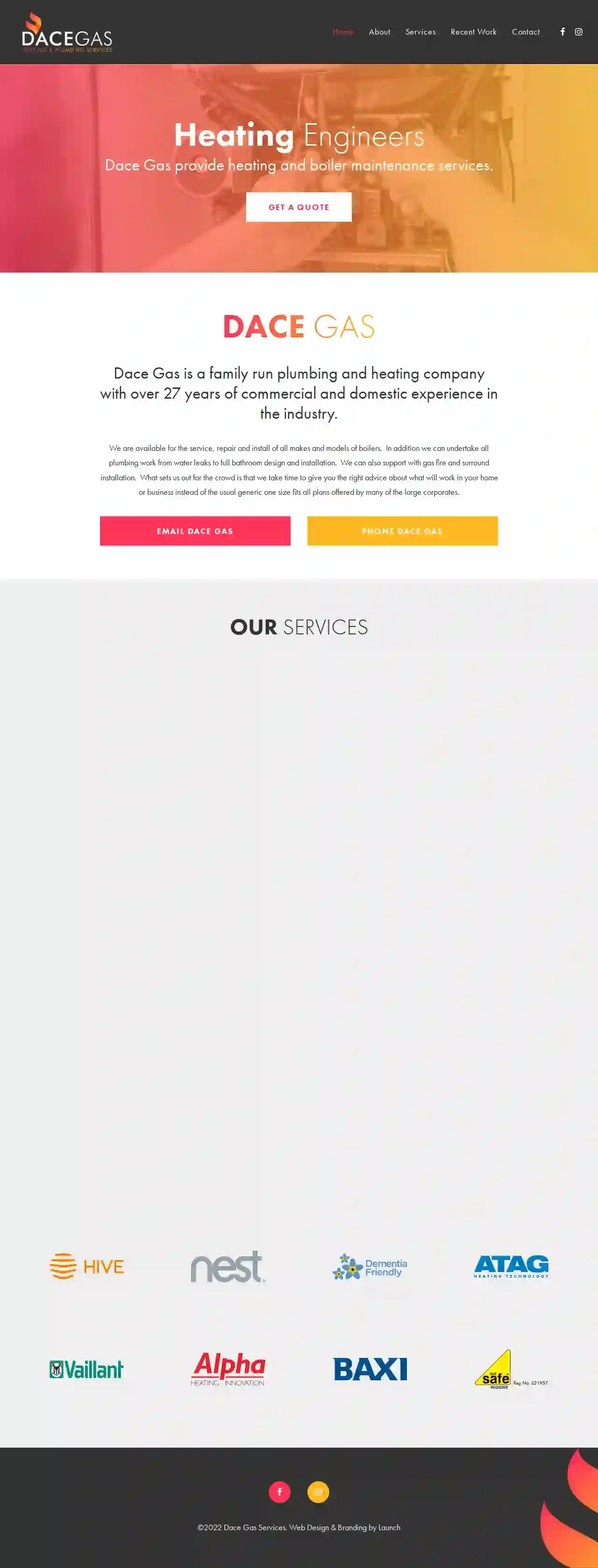
Dace Gas Services
514 reviewsAyr, GBDace Gas is a family run plumbing and heating company with over 27 years of commercial and domestic experience in the industry. We are available for the service, repair and install of all makes and models of boilers. In addition we can undertake all plumbing work from water leaks to full bathroom design and installation. We can also support with gas fire and surround installation. What sets us out for the crowd is that we take time to give you the right advice about what will work in your home or business instead of the usual generic one size fits all plans offered by many of the large corporates.
- Services
- Why Us?
- Gallery
Get Quote
coldstream commissioning limited
Ayr, GBAs Directors of Coldstream Commissioning Ltd we have been involved in all aspects of building services commissioning since 1982 and have over 40 years combined experience within the industry. Our engineers are highly skilled and motivated to provide an efficient & punctual service to all our clients exceeding their expectations. All our works are carried out to the latest BSRIA guidelines.
- Services
- Why Us?
- Accreditations
- Gallery
Get Quote
Macfarlane Heating Services
54 reviews14 Arran View, Stewarton, KA3 5EX, GBWelcome to Macfarlane Heating Services Heating Engineers Ayrshire Macfarlane Heating Services are gas engineers based in Ayrshire. We specialise in heating installations and repairs for our domestic and commercial customers. Our team of experienced engineers install, repair and replace Natural Gas, LPG and Oil boilers as well as warm air systems. For a free quotation, call Macfarlane Heating Services on 01560 482717.
- Services
- Why Us?
- Accreditations
- Gallery
Get Quote
Premier Gas & Mechanical Solutions Ltd
53 reviewsJames Little Street, Unit 5, James Little Ind Estate, Kilmarnock, KA1 4AT, GBPremier Gas & Mechanical Solutions Ltd is a company with 50 years of combined experience in providing gas engineering services. They have worked on 250 projects and have 100's of satisfied customers. Their team of highly skilled Gas Safe Registered engineers strive for excellence in everything they do. They offer a range of services including domestic and commercial gas engineering, radiant tube heaters, central heating power flush, and solar assisted heat pumps. They also provide detailed fault finding and reasonable pricing. Book an appointment by calling 0800 888 6879 or emailing [email protected].
- Services
- Why Us?
- Gallery
Get Quote
Over 12,692+ HVAC Businesses on our directory
Our HVAC experts operate in Troon & surroundings!
HVACCompaniesHub has curated and vetted the Best HVAC Businesses arround Troon. Find the most trustworthy pro today.
Frequently Asked Questions About HVAC Companies
- Split Systems: The most common type, consisting of an outdoor unit (condenser/compressor) and an indoor unit (air handler/furnace).
- Heat Pumps: Provide both heating and cooling by transferring heat between indoor and outdoor air.
- Ductless Mini-Splits: Ideal for homes without existing ductwork or for adding heating and cooling to specific zones.
- Packaged Units: A single unit that contains all the system's components.
- Geothermal Heat Pumps: Use the earth's stable temperature to provide highly efficient heating and cooling.
- AC Repair: [Price Range]
- Furnace Repair: [Price Range]
- AC Installation: [Price Range]
- Furnace Installation: [Price Range]
- Heat Pump Installation: [Price Range]
- HVAC Maintenance: [Price Range]
- Experience and Expertise: Look for installers with experience and a good understanding of AC systems.
- Licensing and Insurance: Make sure the installer is licensed and insured to work in your area.
- Reputation and Reviews: Check online reviews and ratings from other customers.
- Detailed Quotes: Get itemized quotes outlining all costs associated with the installation.
- Warranties: Inquire about warranties on equipment and labor.
- References: Ask for and check references from past customers.
- Communication: Choose an installer who communicates clearly and promptly.
What are the different types of HVAC systems?
How much do HVAC services cost?
What is the best temperature to set my thermostat in summer?
What should I look for when hiring an AC installer?
What are the different types of HVAC systems?
- Split Systems: The most common type, consisting of an outdoor unit (condenser/compressor) and an indoor unit (air handler/furnace).
- Heat Pumps: Provide both heating and cooling by transferring heat between indoor and outdoor air.
- Ductless Mini-Splits: Ideal for homes without existing ductwork or for adding heating and cooling to specific zones.
- Packaged Units: A single unit that contains all the system's components.
- Geothermal Heat Pumps: Use the earth's stable temperature to provide highly efficient heating and cooling.
How much do HVAC services cost?
- AC Repair: [Price Range]
- Furnace Repair: [Price Range]
- AC Installation: [Price Range]
- Furnace Installation: [Price Range]
- Heat Pump Installation: [Price Range]
- HVAC Maintenance: [Price Range]
What is the best temperature to set my thermostat in summer?
What should I look for when hiring an AC installer?
- Experience and Expertise: Look for installers with experience and a good understanding of AC systems.
- Licensing and Insurance: Make sure the installer is licensed and insured to work in your area.
- Reputation and Reviews: Check online reviews and ratings from other customers.
- Detailed Quotes: Get itemized quotes outlining all costs associated with the installation.
- Warranties: Inquire about warranties on equipment and labor.
- References: Ask for and check references from past customers.
- Communication: Choose an installer who communicates clearly and promptly.